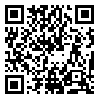دوره 30، شماره 1 - ( زمستان 1400 )
جلد 30 شماره 1 صفحات 29-20 |
برگشت به فهرست نسخه ها
Ethics code: IR.MAZUMS.REC.1399.882
Download citation:
BibTeX | RIS | EndNote | Medlars | ProCite | Reference Manager | RefWorks
Send citation to:



BibTeX | RIS | EndNote | Medlars | ProCite | Reference Manager | RefWorks
Send citation to:
Rahmani N, Nabavian M, Alipour H. Living Experiences of Nursing Students in Caring for Covid-19 patients: a Phenomenological Study. Avicenna J Nurs Midwifery Care 2022; 30 (1) :20-29
URL: http://nmj.umsha.ac.ir/article-1-2335-fa.html
URL: http://nmj.umsha.ac.ir/article-1-2335-fa.html
رحمانی نرگس، نبویان ماجده، علی پور حسین. تجربیات زیستۀ دانشجویان پرستاری در مراقبت از بیمار مبتلا به کووید ـ 19: یک مطالعۀ پدیدارشناسی. مجله مراقبت پرستاری و مامایی ابنسینا. 1400; 30 (1) :20-29
نرگس رحمانی1 

 ، ماجده نبویان1
، ماجده نبویان1 
 ، حسین علی پور*2
، حسین علی پور*2 




 ، ماجده نبویان1
، ماجده نبویان1 
 ، حسین علی پور*2
، حسین علی پور*2 


1- مربی، گروه پرستاری، مرکز تحقیقات جامع سلامت، واحد بابل، دانشگاه آزاد اسلامی، ایران
2- کارشناس هوشبری، مرکز مدیریت حوادث و فوریتهای پزشکی، دانشگاه علوم پزشکی مازندران، ساری، ایران ،h.alipour.1354@gmail.com
2- کارشناس هوشبری، مرکز مدیریت حوادث و فوریتهای پزشکی، دانشگاه علوم پزشکی مازندران، ساری، ایران ،
متن کامل [PDF 1107 kb]
(1419 دریافت)
| چکیده (HTML) (3584 مشاهده)
چکیده گسترده انگلیسی: (1286 مشاهده)
Background and Objective
In January 2020, the Coronavirus disease (COVID-19) was declared an international health crisis by the World Health Organization (WHO). Nurses are mostly in close contact with patients during hospitalization. Since nursing students provide patient care alongside nurses, the identification of nursing students’ lived experiences of caring for COVID-19 patients is of paramount importance in the effective management of the disease. The present study aimed to assess nursing students' experiences of caring for patients diagnosed with COVID-19. Nurses have the closest contact with patients with Covid-19 during treatment in hospitals and spend a lot of time caring for these patients. Nurses need special skills to care for patients. Some issues, such as the private issues of patients, especially at the onset of the disease, the absence of any drugs or vaccines to control the disease, the pressure of the media and psychological espionage, as well as the lack of support from competent authorities, overshadow the performance of health care workers, especially nurses, affecting their accuracy and skill in providing care services and protecting against a disease.
Materials and Methods
This qualitative study was performed using the hermeneutic phenomenological method in 2021. The participants were selected from nursing students with an experience of caring for Covid-19 patients in Mazandaran University of Medical Sciences. Data were collected through semi-structured and individual interviews and analyzed simultaneously and continuously by the Van Manen method. In this study, the phenomenological approach was able to understand the depth of nursing students' experience in patient care since it provides the researcher with lived experiences or experiences of people who have dealt with and experienced the studied phenomenon. Consequently, the researcher will be able to see that experience through the eyes of people who had this experience. This requires people to express their experiences and feelings to the researcher for further interpretation. In this way, the experiences of research participants can be assessed and identified. According to the main research question, the interpretative phenomenological analysis is the most appropriate method.
Results
All participants in the emergency and intensive care unit departments underwent internships in hospitals under the auspices of Mazandaran University of Medical Sciences. All students were 23-25 years old (average of 24 years). Nursing students' lived experiences of caring for Covid-19 patients included three main categories and seven subcategories: 1) conflicting emotions (anxiety, mental involvement, and maturity), 2) psychosomatic problems (sleep disorders, skin problems, and neurological problems), and 3) self-awareness and empowerment (efforts made in patient care and striving for self-preservation).
Conclusion
The findings pointed out that nursing students' experiences of caring for Covid-19 patients included conflicting emotions, psychosocial problems, self-awareness, and empowerment. The experiences of the participants in the present study indicated that nursing students experienced conflicting emotions in the form of anxiety, mental conflict, and feelings of maturity while caring for patients with Covid-19. The results of studies conducted in this regard have demonstrated that nurses experience mental problems in the form of fear, stress, and anxiety during the Covid-19 epidemic. The experience of caring for patients during an epidemic evoked a variety of emotions, including fear, pride, and communication with team members. Nurses in this period needed psychosocial support. These findings are consistent with those obtained in the present study, in which students experienced anxiety and mental involvement as likely to develop illness in themselves or their families. In addition to these emotions, the students felt useful, courageous, and proud of being able to approach and help the patient in these dangerous situations. As evidenced by the results of the present study, nursing students experienced anxiety, stress, and mental preoccupation in caring for Covid-19 patents. Furthermore, participants were satisfied and proud of being able to provide patient care during this period. In this regard, students gained experience in caring for themselves and patients; moreover, they strived to reduce stress and provide proper care. According to the findings of this study, the education system and university administrators can help reduce psychological stress and improve the quality of care in nursing students through holding web-based courses on stress management skills, training on the use of personal protective equipment, and observing health protocols.
نوع مطالعه: پژوهشي اصیل |
موضوع مقاله:
پرستاری
دریافت: 1400/3/3 | پذیرش: 1400/9/6 | انتشار: 1401/2/25
دریافت: 1400/3/3 | پذیرش: 1400/9/6 | انتشار: 1401/2/25
ارسال پیام به نویسنده مسئول
| بازنشر اطلاعات | |
 |
این مقاله تحت شرایط Creative Commons Attribution-NonCommercial 4.0 International License قابل بازنشر است. |




 gmail.com
gmail.com